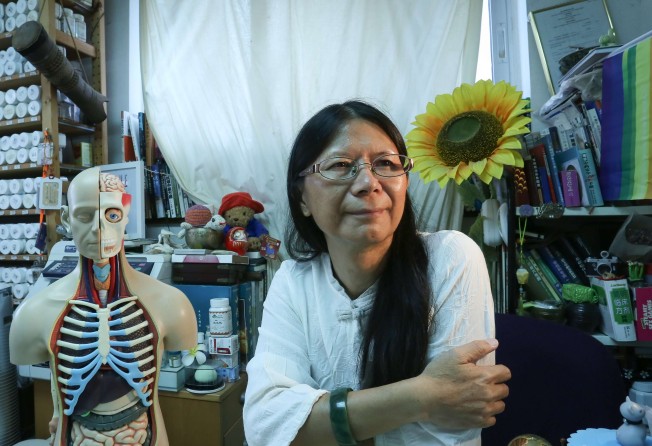Intersex Hongkonger wages one-person campaign for third gender recognition
Diagnosed male but found to have female organs, LGBTI advocate argues city’s intersex individuals would suffer less if the census recognised them

Hongkongers should be given an option to identify themselves as neither male nor female but “intersex” in the next citywide census, according to an activist who has pledged to launch a campaign for the third category.
Small Luk, born neither fully male nor female, argued that establishing a database on people who are intersex is crucial to recognising the existence of a highly marginalised group, encouraging the government and other organisations to develop policies to offer individuals adequate help.
Watch: ‘There must be hundreds of intersex people in Hong Kong’
At birth, Luk was diagnosed as genetically male based on the vestiges of male genitals and was forced to go through years of painful operations to correct the anatomy as he matured. That included constructing a urethra so that he did not need to urinate like a girl.
But it was only revealed three decades later that Luk, now 51, actually had an undeveloped uterus and vagina.
The finding prompted the registered social worker to remove the male genitalia and live as a woman thereafter.
“When I was young, I always wondered whether I was the only one in the world going through such an ordeal,” Luk told the Post.
“Building a database doesn’t mean I would be able to meet my counterparts, but at least I’d know I’m not alone.”
Luk believed Hongkongers would be accepting of intersex individuals, but said the government’s reluctance hindered progress in the city.
When I was young, I always wondered whether I was the only one in the world
She claimed a senior official from the Census and Statistics Department dismissed her suggestion months ago to include “intersex” in the by-census conducted between June and August.
“The official said interviewees would be reluctant to admit they are intersex, thus undermining the accuracy of the data collected,” Luk said. “The official has no right to assume people would not answer. That is completely unprofessional.”
The third option would be a significant step forward for the community even if the census underestimated the total number of intersex people, Luk argued. She said she hoped the option could eventually be provided in the city’s next census, which is to be conducted in 2021.
Officially recognising the existence of intersex people would clear the obstacles that many organisations currently face as they conducted public education on the sensitive issue, she said.
In 2011, Nepal became the first country in the world to grant official recognition to the so-called third gender in its census.
In May, the Office for National Statistics in Britain launched a public consultation on whether to include questions relating to sexuality and “gender identity” in the census to be carried out in 2021. It stated there was a clear need for “improved information” on the matter.
Luk said LGBTI issues had gained acceptance in the city. But she argued intersex individuals remained highly marginalised and that few were willing to come out.
“If the appearance of the intersex person resembles the gender stated in his or her identity card, then not many problems surface,” Luk said, adding such individuals seldom declare their situation as they wish to protect themselves from possible trouble.
“But if [their appearance and the stated gender] do not match, they won’t escape discrimination and bullying as they grow up … and they might feel they do not want to continue living.”
Luk decided to come out in 2011 and advocated for intersex rights believing dramatic improvement could happen over a short period of time if the government was willing to act.
“We are born in this condition and I believe people would be sympathetic to our situation,” she said. “If our existence is acknowledged by the government, more people would come out and more would be willing to stand up for us.”
A Census and Statistics Department spokeswoman said it was not common for economies similar to Hong Kong to include an intersex option.
But an Equal Opportunity Commission spokesman said the city should look beyond customary practice.
He said the government should look into the matter with the goal of “advancing equality, developing better policies and providing sufficient support for the LGBTI community”.